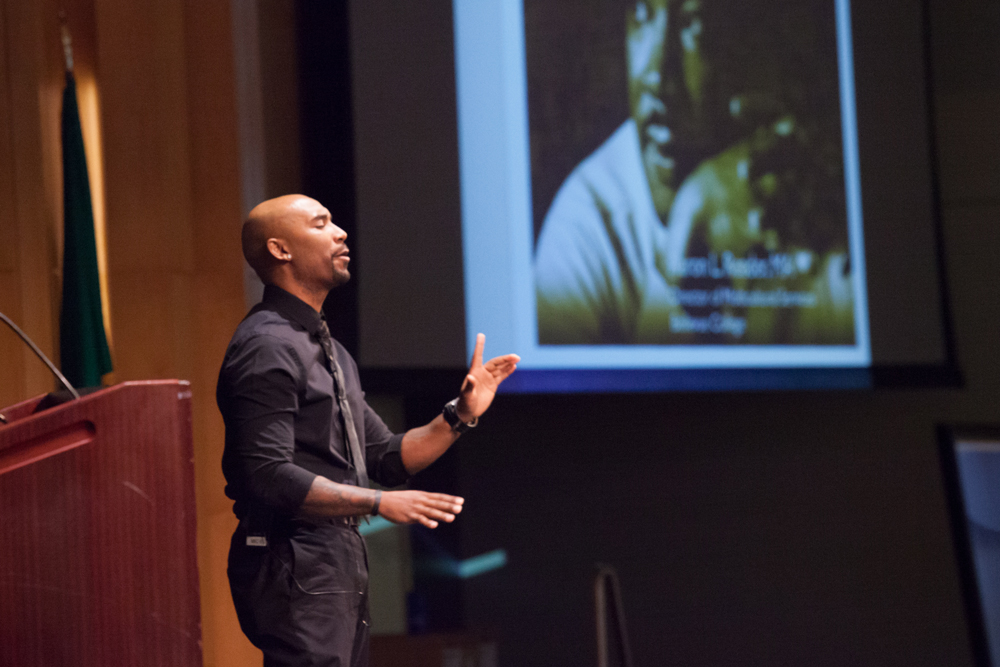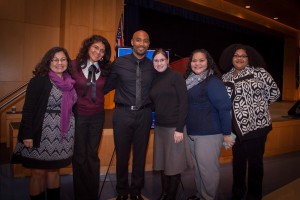Spoken-word artist Aaron Reader gives keynote address at King Day celebration

“Poetry is about being able to speak the truth,” said Aaron Reader in his keynote address during Clark’s 2015 Martin Luther King observance. “And Dr. King not only spoke the truth, he acted on it.”
“Dr. King started the battle, but the war has not been won.”
That was one line from “Sleepwalking,” the poem spoken-word artist Aaron Reader chose to begin his presentation honoring the legacy of Dr. Martin Luther King Jr., held January 21 in Gaiser Student Center. Reader had come to Clark as the keynote speaker for the college’s annual Martin Luther King Day observance.
“It’s because of Dr. King that I am able to speak to you today,” Reader told his audience. “It’s because of Dr. King that I was able to get a master’s degree. At one point, people like me didn’t even go to college.”
Reader grew up in Oakland, California. In his teens, he began using poetry as an outlet to express the ups and downs of being a young African-American male in inner-city America. Today, in addition to his spoken-word performances and his work as a motivational speaker and workshop facilitator around issues of diversity and equity, he also serves as the director of multicultural services at Bellevue College.
In was in his capacity at the college that he was invited to participate in a seven-day bus tour of significant sites from the 1960s civil rights movement, and much of his presentation focused on that experience.
“I went to the south and I realized that I have been sheltered living here in the Pacific Northwest,” he said. “We went to a spot where we got off the bus, and the guide said, ‘We don’t let students go down that road there because that’s where the Ku Klux Klan are.’”

Aaron Reader with MLK Celebration Committee members, left to right, Felisciana Peralta, Rosalba Pitkin, Michelle Golder, Rosalyn Guerrero, and Dolly England.
Reader said that the experience not only gave him a deeper connection to the history of civil rights in this country, but also some uncomfortable insight into disparities that remain today. He recounted one moment when the 30 members of his tour group—a combination of college students, employees, and alumni—arrived at the Lorraine Motel, where Dr. King was shot and killed in 1968 on the second-floor balcony.
“I’m looking up at this thing and I’m starting to lose it,” recalled Reader. “I’m getting choked up. Some of the students were starting to cry. And then one of the [white] faculty said, ‘How many of you are up for Starbucks?’”
Reader said that afterward, he had private conversations with some of his colleagues to explain how that moment had been hurtful to the students of color on the tour. He told the audience to be ready to have such conversations themselves. “As social-justice activists, as warriors, you’re going to have to be comfortable with being uncomfortable,” he said.
Afterward, during a question-and-answer period following Reader’s presentation, a white faculty member asked how she and her white colleagues at Clark could help support diverse students at the college.
“Number One is to listen,” Reader advised. “Oftentimes, I think that when we think we get it, we shut our ears off. Don’t be so quick to say, ‘I understand.’ Before you say you understand, take a moment to really listen.”
Photos: Clark College/Jenny Shadley
Video: Nick Bremer-Korb












